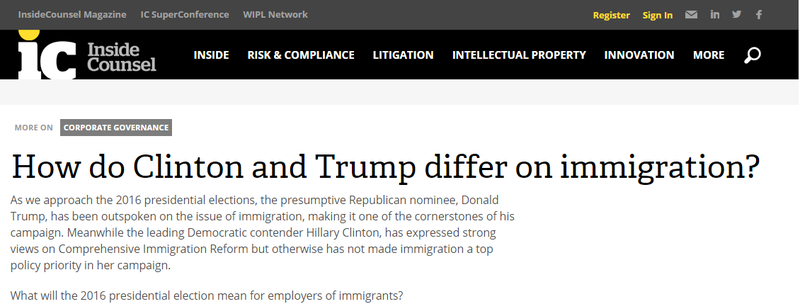How do Clinton and Trump differ on immigration?
As we approach the 2016 presidential elections, the presumptive Republican nominee, Donald Trump, has been outspoken on the issue of immigration, making it one of the cornerstones of his campaign. Meanwhile the leading Democratic contender Hillary Clinton, has expressed strong views on Comprehensive Immigration Reform but otherwise has not made immigration a top policy priority in her campaign.
What will the 2016 presidential election mean for employers of immigrants?
High-skilled immigration and the domestic workforce
On the H-1B program, which allows U.S. employers to sponsor foreign degreed workers in specialty occupations (i.e. IT, finance, law), Trump proposes to raise the wage requirements; he further wants to require U.S. companies to consider American workers before offering jobs to foreign workers. While this sounds fine in theory it’s hard to imagine in practice—would it look something like the cumbersome and outdated PERM labor certification process? Further, Trump proposes a moratorium of unspecified duration on the issuance of all green cards, during which time US employers would be required to hire from the pool of unemployed domestic workers.
Clinton supports increasing the H-1B cap to grant more professional specialty workers permission to work in the US on an annual basis. She names as critical issues raising incomes for US workers, increasing the minimum wage and strengthening overtime rules, and providing healthcare and paid family and medical leave for all workers.
In reality, neither of the candidates has had a lot to say on high-skilled immigration, and it seems that neither views the issue as a top concern. It is likely that in either presidency, the majority of action on high-skilled immigration will happen on an agency / administrative level, as has been the case for years, due to the substantial challenges of getting legislation passed in this area.
EB-5 immigrant investors
While neither candidate has expressed an explicit position on the controversial EB-5 program, which allows foreign investors to obtain a green card with a minimum investment of $500,000 and creation of at least 10 jobs for US workers, both candidates have been connected to the program in the news.
Clinton has been linked to the topic through her brother Tony Rodham, who is involved with a company called Global City Regional Fundand who has been accused of using (and perhaps misusing) his connection with his powerful sister and brother in law to attract and expedite applications for foreign investors.
Meanwhile Trump, who has been outspoken about the security threats he believes are posed by Chinese immigrants, has lent his name to the “Trump Bay Street,” a $200 million luxury rental apartment building in Jersey City, New Jersey that has raised about a quarter of its funding from EB-5 investors, almost all of whom are Chinese.
E-verify
The current authorization for E-verify, an Internet-based system that allows businesses to determine the eligibility of their employees to work in the United States, will expire on September 30, 2016, the same day as the authorization for EB-5.
Trump’s immigration plan supports a uniform national standard for E-verify, which he says will protect jobs for unemployed Americans.
Clinton has not expressed a position on E-verify though some Democratic leaders oppose expansion of the program due to the havoc it would create on employers of unskilled and low-skilled workers, as well as concerns over the impact false positives for legitimate workers.
Comprehensive immigration reform
Regarding comprehensive immigration reform and the undocumented, Clinton’s platform states she will implement “comprehensive immigration reform to create a pathway to citizenship, keep families together, and enable millions of workers to come out of the shadows.” .
On this topic the candidates couldn’t be further apart. Trump proposes a mass deportation of all 11 million undocumented workers, and wants to eliminate birthright citizenship for children of the undocumented. In addition he proposes to triple the number of ICE officers and to build a permanent border wall between the US and Mexico (for which he wants Mexico to pay). .
However, according to Andy Zausner, a shareholder in the government law and policy practice at Greenberg Traurig, “With Trump everything with respect to policy is subject to negotiation.” On comprehensive immigration reform, Zausner thinks that of the two candidates, Trump might actually be the more likely to get it done. “It’s always Nixon who goes to China,” Zausner says. In other words, just as he has done to date, if elected president Trump will likely not cease to surprise us.
Mentions
States
- New Jersey
Videos





Subscribe for News
Site Digest
Join Professionals on EB5Projects.com →
Securities Disclaimer
This website is for informational purposes only and does not constitute an offer or solicitation to sell shares or securities. Any such offer or solicitation will be made only by means of an investment's confidential Offering Memorandum and in accordance with the terms of all applicable securities and other laws. This website does not constitute or form part of, and should not be construed as, any offer for sale or subscription of, or any invitation to offer to buy or subscribe for, any securities, nor should it or any part of it form the basis of, or be relied on in any connection with, any contract or commitment whatsoever. EB5Projects.com LLC and its affiliates expressly disclaim any and all responsibility for any direct or consequential loss or damage of any kind whatsoever arising directly or indirectly from: (i) reliance on any information contained in the website, (ii) any error, omission or inaccuracy in any such information or (iii) any action resulting therefrom.



